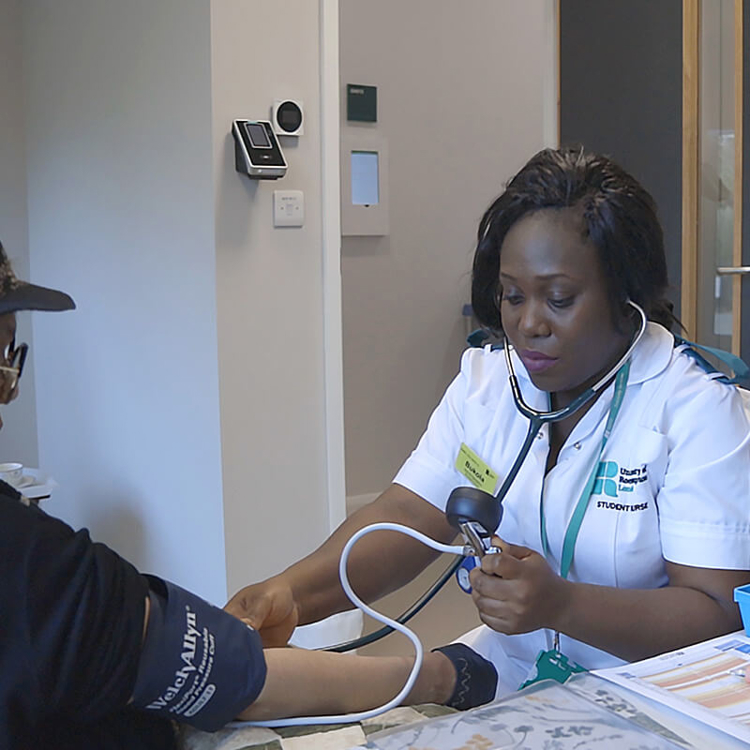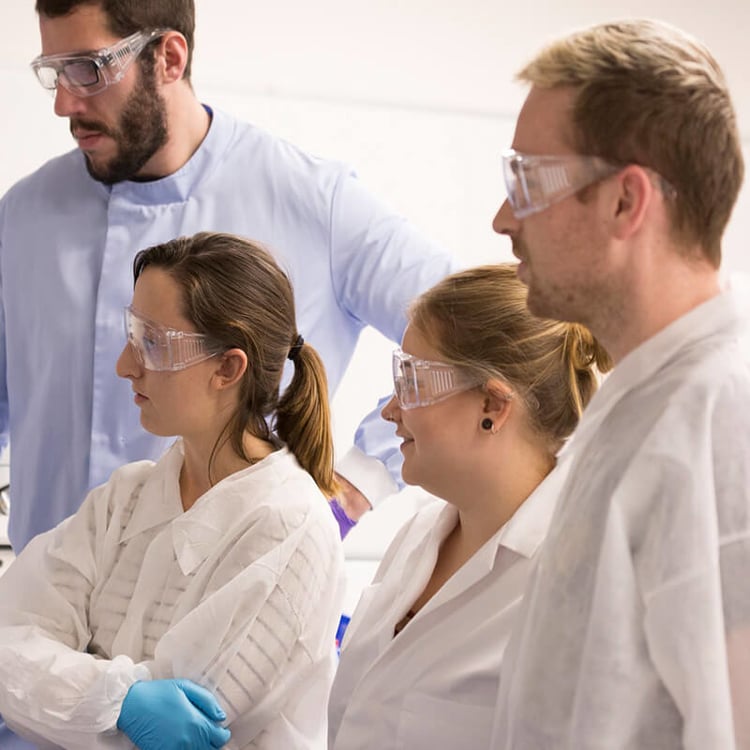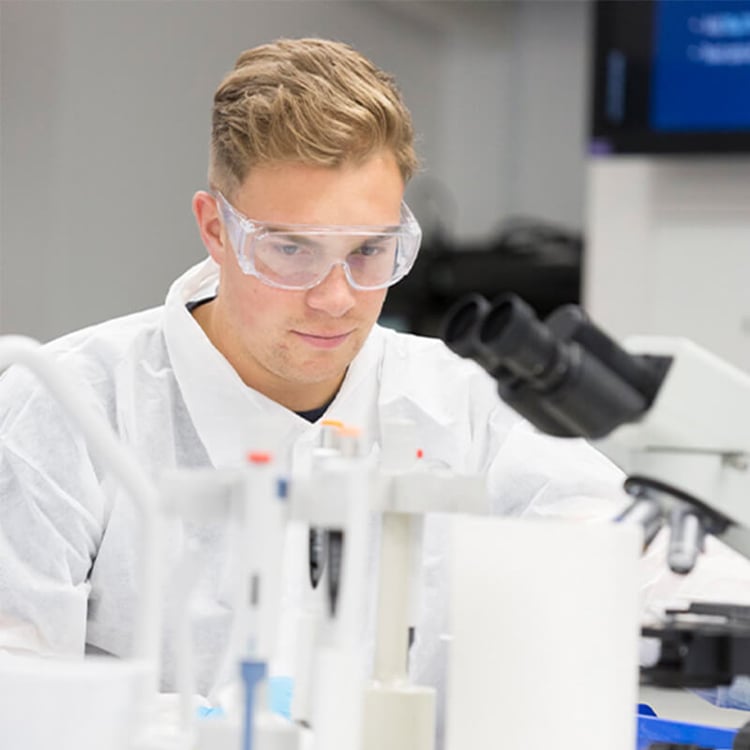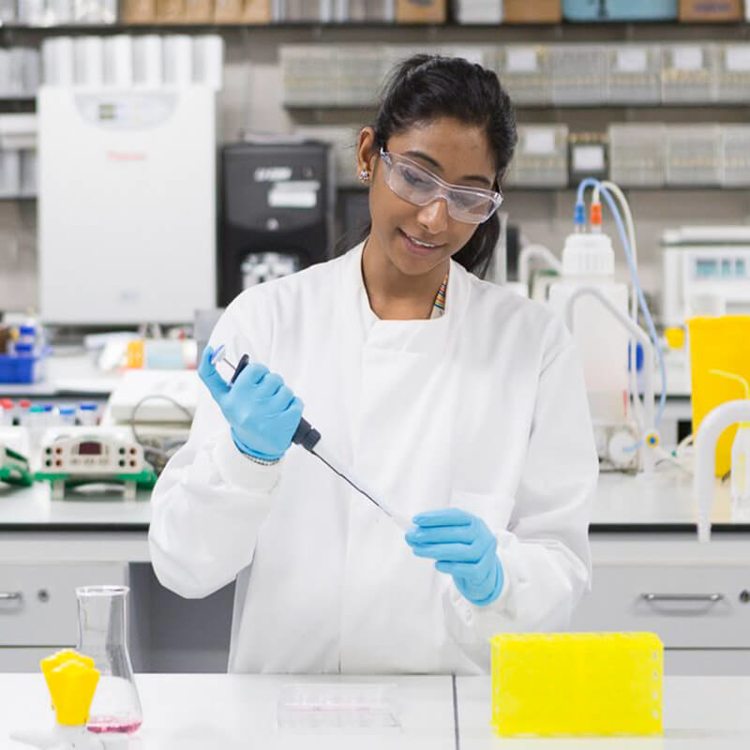Entry tariff:
112–128 UCAS points (or equivalent)
IELTS: 6.5 (for degree course)
International Foundation Pathway:
64 UCAS (or equivalent)
IELTS: 5.5 (for foundation entry)
UCAS Code:
B940
B944 (if choosing foundation year)
Start date(s):
September 2026
Make a difference to human lives by exploring the science behind health, disease, and the treatment and prevention of illness.
In an ever-evolving world of healthcare and biotechnology, our Biomedical Science degree equips you with the practical and professional skills needed to improve human health and advance medical discovery.
You’ll develop a strong understanding of the biological processes that underpin human health through subjects such as:
- Cell Biology – exploring the structure and function of cells and their role in health and disease.
- Molecular Biology – examining the molecular mechanisms that control genetic processes and their implications in disease.
- Pharmacology – understanding how drugs interact with the body and their effects in treating illness.
- Immunology – investigating how the immune system protects us from infection and disease.
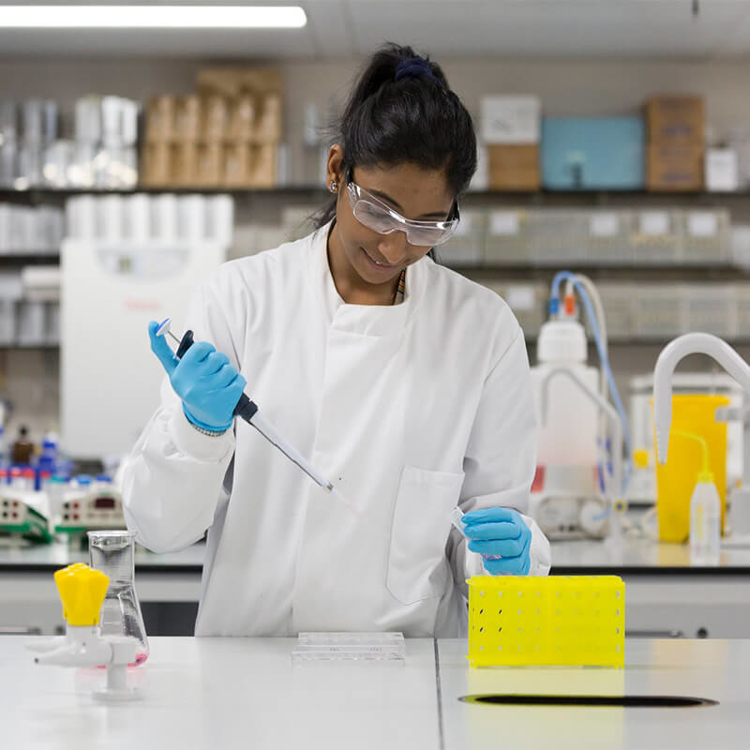
Through hands-on laboratory work, you’ll gain valuable analytical and qualitative research skills while also developing key professional attributes such as teamwork, communication, and problem-solving.
Your employability is at the heart of the programme. You’ll have the opportunity to complete an optional paid work placement between Years 2 and 3, gaining real-world experience to enhance your career prospects.
With a degree designed in line with current industry practices and emerging challenges in biomedicine and biotechnology, you’ll graduate with the expertise, confidence, and professional recognition to make a lasting impact in the health sector.
Top 3 modern university in London
(Complete University Guide 2025)

Ranked in the top 15% in the world
Times Higher Education Young University Rankings 2024

Ranked 3rd in the UK for Academic Support
National Student Survey 2024 for Biosciences

Modules
In this module, you will be introduced to an understanding of the chemical, cell and tissue organisation of the human body and of disease-causing organisms, as a foundation of modern diagnostics and biomedicine. You will gain practical experience in various laboratory techniques for the rigorous and effective analysis of various diagnostic specimens. Laboratory investigations of human diseases are grounded in basic sciences that may be familiar from school: chemistry, physics, cell biology, and mathematics. This module will (re-)introduce you to these foundational concepts and illustrate, with reference to specific disease examples, how they can be applied to understand and diagnose disease processes in the human body.
The aim of this interprofessional module is to introduce you to the key concepts and core foundations for the scientific study of life. A strong interprofessional ethos is built by bringing you and other students together and creating the opportunity to interact with and learn alongside students from a breadth of professional programmes. Subsequent modules will build on and integrate the strong foundations gained through this module to support the development of required profession specific knowledge and skills. You will develop a solid understanding of the structure and function of living organisms through the study of anatomy and physiological systems relevant to your programme of study. You will explore core physiological principles across the lifespan and, where appropriate, examine deviations from normal function, including aspects of pathophysiology.
This module offers a foundational introduction to molecular biology within Biomedical Science and other biological sciences. You will study the chemical structure and function of DNA, RNA, and proteins, gaining insight into how genetic information is stored, transmitted, expressed, and regulated in prokaryotic and eukaryotic cells. Core topics include DNA replication, transcription, translation, the Genetic Code, and the Central Dogma of Molecular Biology. You will also examine enzyme function, genetic inheritance patterns, and the relationship between genotype and phenotype in normal physiology and disease.
Module details: In this module, you will learn from, about, and with peers from other professional programmes, supporting interprofessional collaboration. You will develop essential academic and study skills while exploring what it means to be a professional. The module will examine key ethical, legal, and regulatory frameworks relevant to each student’s chosen discipline. Through shared learning and reflection, you will begin to build a strong professional identity within the wider context of health and social care practice.
These are the current planned modules on this course and may be subject to change.
You will conduct various biochemical and molecular laboratory investigations to understand and diagnose genetic, metabolic and malignant diseases. You will also use case studies to appreciate the emerging role of big data sets resulting from comprehensive molecular surveys in biomarker and drug discovery, disease classification, and understanding disease mechanisms.
You will survey bacteria, viruses, fungi, protozoa and worms, exploring how they coexist with us or cause illness. You will do experiments to identify, grow and characterise these organisms and learn about the growing global challenges of antimicrobial resistance, emerging infections, and the role of public health and infection control.
You will learn how the immune system responds to injury and infections. You will understand how it “learns” about past infections, responds appropriately to different infectious organisms, and regulates itself. You will understand how the immune system contributes to disease, whilst also giving us tools to diagnose and treat diseases.
In this module, you will develop skills in distinguishing signal from noise by understanding, applying and interpreting statistical analyses and distinguishing good from bad research studies. You will consider the choice of investigative techniques, study designs and statistical tests and address ethical, safety and quality issues arising in biomedical research.
These are the current planned modules on this course and may be subject to change.
This course offers all students the option of a one-year paid work placement, to boost your employability even further. If you choose this route, you will take the placement following year two of your course, and then return to complete your degree.
Why take a placement?
A placement year is the perfect opportunity to gain valuable work experience, to build on the career skills we will teach you on this degree. The connections you make on the placement will improve your career prospects further, and equip you with the skills you need to secure graduate-level employment.
How we support you
The University's Placement and Work Experience Team are experts at helping you to secure a placement. They will work closely with you from the start, helping you research potential employers, discover placement opportunities, create and pitch your CV, and will coach you to perform well in interviews. We aren't able to guarantee a placement, but our sector-leading advisors will give you the best possible chance of securing one.
Find out more about how we'll support you
We understand that your plans might change once you start your programme. If you decide not to do a placement, you will have the option of completing the three year version of your programme.
Whatever your choice, you will have access to many opportunities for work experience through our Placement and Work Experience Team, and access to face-to-face and 24/7 online careers support.
You will learn about diseases affecting the different molecules and cells found in the blood, whether they are caused by poisoning, the side effects of drugs, genetic diseases, nutritional deficiencies, “blood cancers” or immune system dysfunction. You will learn about their diagnosis and treatment, including the use of blood products.
All Biomedical Science lecturers are experts who carry out and supervise research in specialist biomedical subjects. This programme will expose you to a range of biomedical research conducted in our School. We will take you to the current edge and work with you to explore related research literature.
Biomedicine has succeeded in improving human health and extending life, but many challenges remain. In this module, you will use an interdisciplinary approach to investigate “wicked” problems in biomedicine, such as obesity and metabolic disease, autoimmune and post-viral conditions, neurodegenerative and neurodevelopmental conditions, and cancers that are difficult to treat.
You will undertake your own research project to address a biomedical challenge, working with expert supervision. You’ll collect data through surveys, computational analysis or laboratory investigations, with due regard for rigorous research design, building on an understanding of scientific literature and consideration of any ethical, regulatory, safety and quality issues.
These are the current planned modules on this course and may be subject to change.
This course offers a foundation year, which takes place at the beginning of your studies. Studying a foundation year will give you academic and practical experience, and a strong introduction to your subject, ensuring you succeed on your undergraduate degree.
30 credits
You will develop your core academic and integrated English language skills of speaking, listening, reading and writing. You will become familiar with key academic skills and concepts, such as referencing methods and awareness of academic integrity and tone. You will apply these skills and knowledge to both broad topics and also your chosen subject pathway.
Teaching and learning
You will be required to actively engage in on-campus learning for up to 10 hours a week.
You will be taught through a full range of teaching and learning methods, which include lectures, seminars, workshops, discussion groups, group directed tasks and presentations. This will enable you to learn from your peers and tutors in both structured and information settings.
You will be encouraged to think creatively about your approach to learning and discussions with your peers. You will also have access to recordings, resources, links and signposting through Moodle to enrich your learning.
Assessment
You will be assessed through group and individual presentations, comparative and reflective essays, multiple choice exams, coursework and reports, oral exams, portfolios, case studies and blogs.
30 credits
You will develop your core academic and integrated English language skills of speaking, listening, reading and writing. You will become familiar with key academic skills and concepts, such as referencing methods and awareness of academic integrity and tone. You will apply these skills and knowledge to both broad topics and also your chosen subject pathway.
Teaching and Learning
You will be required to actively engage in on-campus learning for up to 10 hours a week.
You will be taught through a full range of teaching and learning methods, which include lectures, seminars, workshops, discussion groups, group directed tasks and presentations. This will enable you to learn from your peers and tutors in both structured and information settings.
You will be encouraged to think creatively about your approach to learning and discussions with your peers. You will also have access to recordings, resources, links and signposting through Moodle to enrich your learning.
Assessment
You will be assessed through group and individual presentations, comparative and reflective essays, multiple choice exams, coursework and reports, oral exams, portfolios, case studies and blogs.
30 credits
You will develop your research, numeracy and information technology skills. You will investigate the difference between primary and secondary research, conduct your own research project and demonstrate your findings through data analysis. You will also develop your awareness of equality, diversion and inclusion in the UK, through a real-world issue; discrimination in the workplace.
Teaching and learning
You will be required to actively engage in on-campus learning for up to 10 hours a week.
You will be taught through a full range of teaching and learning methods, which include lectures, seminars, workshops, discussion groups, group directed tasks and presentations. This will enable you to learn from your peers and tutors in both structured and information settings.
You will be encouraged to think creatively about your approach to learning and discussions with your peers. You will also have access to recordings, resources, links and signposting through Moodle to enrich your learning.
Assessment
You will be assessed through group and individual presentations, comparative and reflective essays, multiple choice exams, coursework and reports, oral exams, portfolios, case studies and blogs.
30 credits
The module provides you with an essential introduction to the core principles and concepts that underpin biological sciences and offers you a multidisciplinary approach to understanding life at the molecular, cellular, and organismal levels.
You will examine how genetic, environmental, and socio-economic factors affect biological processes, with a focus on how certain groups may experience differing health risks or benefits. For example, you will study how genetic disorders, and metabolic diseases manifest differently across ethnic groups, and how access to healthcare or diagnostic tools can vary globally.
Throughout the module, case studies and discussions will emphasize the importance of inclusive practices in scientific research and healthcare, ensuring that biological studies and their applications reflect and serve the needs of all communities. Additionally, career-focused workshops will address the importance of diversity in STEM fields, providing you with a broader understanding of career opportunities and the role inclusivity plays in advancing biological sciences.
The module addresses sustainability through its focus on human health, environmental factors influencing biology, and the role of biological sciences in solving global challenges.
Topics such as metabolic processes, water balance, and body fluid composition can help you understand the body’s need for sustainable nutrition and hydration. Furthermore, by discussing diagnostics such as blood glucose testing and the effects of pollutants or chemicals (like endocrine disruptors in cosmetics), the course encourages you to think critically about sustainable practices in healthcare and their impact on individual and environmental health.
You will learn about genetic disorders and viral infections that affect populations worldwide, gaining insight into health issues across different regions. Case studies on health disparities and global diseases will be integrated into lessons to ensure you are aware of the worldwide scope of biological and medical science.
Teaching and learning
Through a combination of lectures, interactive seminars, laboratory sessions, and group projects, you will explore topics such as cellular structure and function, molecular biology, biochemistry, physiology, and homeostasis.
The module also gives you the opportunity to develop practical laboratory skills, critical thinking, and quantitative analysis, ensuring you are well-prepared for advanced study, research and undergraduate level.
The teaching delivery for each module consists of one, one-three-hour lecture and one, two-hour seminar per week. Lectures will cover core indicative content, while seminars will consist of research workshops, small group learning on relevant case studies and practical lab sessions.
You will also have an additional 30 minutes of online support each week, which will consist of formal preparation/review of lab sessions, or exam preparation (e.g. quizzes).
Assessment
This module will be assessed using an open book in-class test and a lab report and reflection.
50% - open book in-class test, consisting of 30 multiple choice questions.
50% - lab report and reflection, the report will include detailed analysis (quantitative and qualitative) of a chosen practical lab session, with an evaluative reflection of the practical limitations and implications of the undertaken research/experimentation.
30 credits
This module provides you with a comprehensive introduction to the principles of human health, the mechanisms underlying diseases, and the tools used to study them.
This interdisciplinary module integrates knowledge of physiology, pathophysiology, epidemiology, and biostatistics to equip you with a well-rounded understanding of the factors that influence human health and the burden of disease.
The module explores health disparities and inequities across global populations, emphasising how factors like ethnicity, socio-economic status, gender, and geography influence health outcomes. You will analyse worldwide health statistics, such as life expectancy, infant mortality rates, and access to healthcare, to understand systemic inequalities. Case studies will focus on specific healthcare challenges, such as the unequal burden of non-communicable diseases (NCDs) in low- and middle-income countries, or disparities in vaccination rates across regions.
Sustainability is embedded by exploring the role of health systems in promoting long-term wellbeing and reducing environmental impacts. Topics such as the rise of sustainable healthcare practices, including reducing medical waste and using renewable resources in healthcare delivery, will be discussed. You will also reflect on how public health policies can contribute to sustainable development goals by promoting preventative care and addressing environmental factors that affect human health.
Global engagement is incorporated through an examination of how diseases and health interventions are influenced by global factors such as pandemics, climate change, and globalisation.
You will analyse global health policies, including the role of organisations like the WHO in managing health crises, and investigate variations in disease prevalence and healthcare access across different countries. Comparative research tasks will help you appreciate the global nature of health challenges and solutions, such as those experienced during the COVID pandemic.
Teaching and learning
Through a blend of lectures, practical sessions, and research-focused activities, you will explore the key physiological systems that maintain homeostasis, the causes and mechanisms of diseases, and the role of public health interventions.
The module will also introduce you to fundamental research methodologies and statistical analysis, emphasizing the importance of data-driven decision-making in health sciences.
The teaching delivery for each module consists of one, one-three-hour lecture and one, two-hour seminar per week. Lectures will cover core indicative content, while seminars will consist of research workshops, small group learning on relevant case studies and practical lab sessions.
You will also have an additional 30 minutes of online support each week, which will consist of formal preparation/review of lab sessions, or exam preparation (e.g. quizzes).
Assessment
This module will be assessed using an infographic and a data analysis report.
50% - infographic, you will design an engaging and evidence-based infographic that communicates a key public health message to a target audience.
50% - data analysis report, you will be required to complete a structured data analysis report based on the analysis of a provided dataset related to a public health issue.
These are the current planned modules on this course and may be subject to change.
Careers
A BSc Biomedical Science degree from Roehampton provides a strong foundation for a wide range of rewarding and impactful careers in the health and life sciences.
Our programme is designed to help you develop the confidence, knowledge, and transferable skills needed to thrive in a variety of professional environments.
You’ll graduate with valuable experience in laboratory techniques, data analysis, research, and scientific communication – skills that are highly sought after across the biomedical, healthcare, and pharmaceutical sectors.
Our graduates go on to pursue careers in areas such as microbiology, haematology, immunology, cellular sciences, drug discovery, genetics, and neuroscience. Many work within the NHS or the biopharmaceutical industry, while others contribute to improving healthcare access and outcomes within their communities.
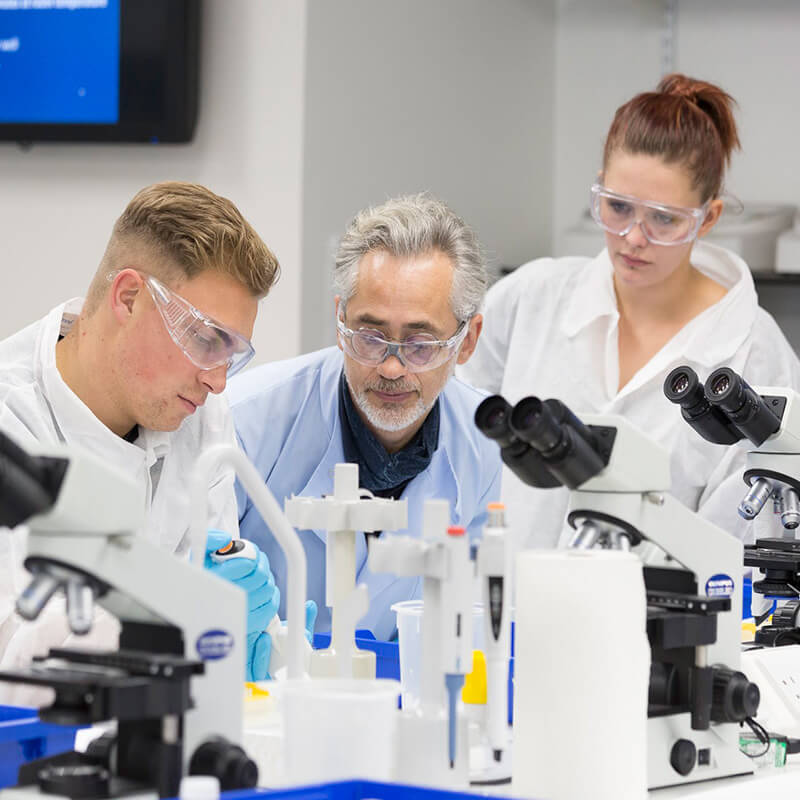
The Student Futures team is here to support you throughout your time at Roehampton and beyond.
They offer services tailored to your needs, helping you take confident steps towards your future.
You’ll have access to a wide range of career workshops and events, where you can engage with employers and develop the skills you need to succeed in the workplace.
These opportunities will help you build your CV, prepare for interviews, and connect with successful Roehampton graduates who are thriving in their careers. You’ll also be able to engage with our partners across London and beyond.
Wherever you want to go in the future, you'll be preparing for the world of work from your very first day.
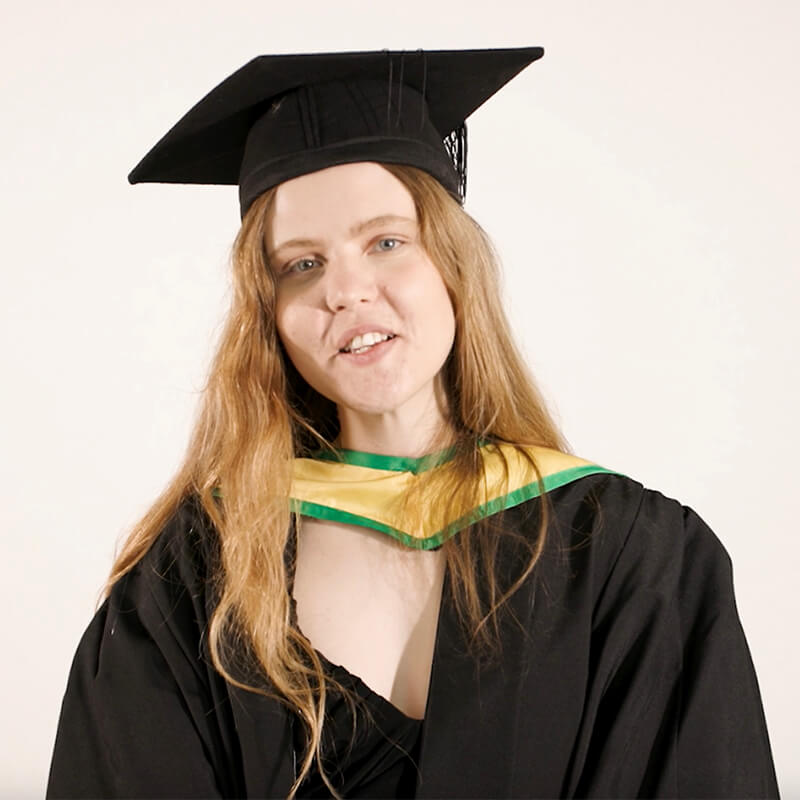
"As an aspiring female scientist, Dr. Yolanda Calle-Patino was a great role model who inspired me through the way she conducted her research, treated people, and discussed scientific concepts."
Katie Birditt, BSc Biomedical Science graduate.
Learning & assessment
How you’ll learn
Through a combination of lectures, workshops, and hands-on laboratory sessions, you’ll explore essential topics in human health and disease, working both independently and in small groups to apply your learning in practical contexts.
You’ll investigate subjects such as the causes and mechanisms of disease, advances in molecular biology and biotechnology, and the science behind brain function and health. In your final year, you’ll take greater ownership of your studies by undertaking independent research on a topic of your choice, allowing you to deepen your expertise in a specialist area of biomedical science.
You’ll learn from a dedicated team of experienced academics and industry professionals, supported by access to exceptional facilities, including:
- Specialist laboratories equipped for DNA analysis, microscopy, and biomedical testing.
- Modern computer suites with expert IT and laboratory technicians to guide your practical work.
Collaborations with leading medical and research institutions across London provide opportunities for hospital visits, research projects, and access to specialist libraries, helping you connect your learning to real-world biomedical practice
How you'll be assessed
Throughout the course, you’ll complete a variety of assignments designed to challenge and enhance your scientific knowledge and technical ability.
These include:
- online tests
- written examinations
- laboratory reports
- presentations
- essays
- independent research projects.
Many assessments will help you to apply theoretical concepts to practical scenarios, building the analytical, problem-solving, and communication skills valued by employers.
By the end of the degree, you’ll have developed a thorough understanding of both the scientific principles and hands-on techniques that define biomedical science, ready to take the next step in your professional journey.
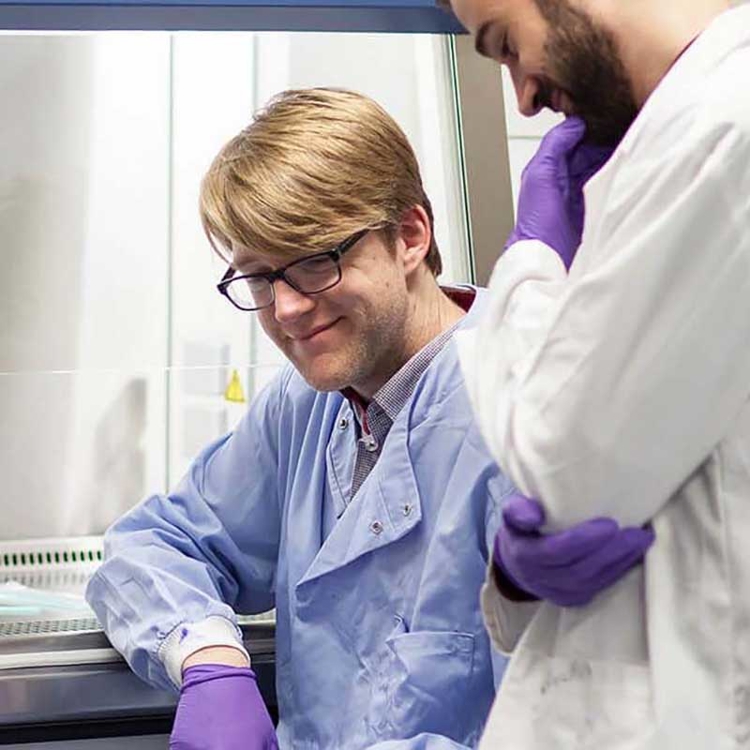
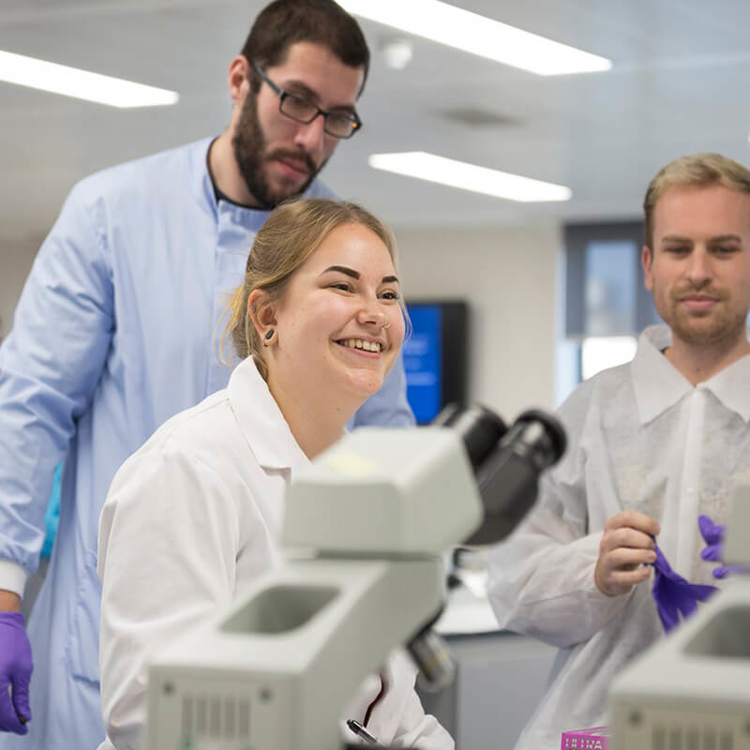
Hands-on learning in state-of-the-art facilities
Our Biomedical Science laboratories at Whitelands College are designed to support practical learning and advanced research in health and disease. You'll have access to state-of-the-art facilities that allow students and staff to carry out cutting-edge biomedical investigations.
Our high-tech laboratories support your practical learning and research, offering high-specification liquid chromatography and a radioisotope laboratory for advanced analytical work.
For biological research, you'll use dedicated cell culture and in vitro imaging facilities to gain hands-on experience in areas like neural stem cell biology, cell biology, and immunology.
Open days
Get a real taste of our campus, community and what it’s like to study at Roehampton
Applying
Full-time UK undergraduate students apply through UCAS.
Entry tariff
112–128 UCAS points (or equivalent)
Foundation Year: 64–80 UCAS points (or equivalent)
Looking to work out your UCAS points or find out about our entry requirements? Find out more.
When we consider applications to study with us, we form a complete view of your achievements to date, and future potential, and can offer flexibility in entry requirements. Find out more about our Contextual Offer scheme.
Specific entry requirements
A level/BTEC (or equivalent qualification) required in Biology or Chemistry.
GCSE (or equivalent) requirement: Maths, Grade C/4.
General entry requirements
International undergraduate students apply through our direct application system.
Entry tariff
112–128 UCAS points (or equivalent)
IELTS: 6.5 (with at least 5.5 in each skills area)
Looking to work out your UCAS points or find out about our entry requirements? Find out more.
When we consider applications to study with us, we form a complete view of your achievements to date, and future potential, and can offer flexibility in entry requirements. Find out more about our Contextual Offer scheme.
Specific entry requirements
A level/BTEC (or equivalent qualification) required in Biology or Chemistry.
GCSE (or equivalent) requirement: Maths, Grade C/4.
General entry requirements
Fees and funding
UK students
Tuition fees
| Entry date | Undergraduate Year 1 | Undergraduate Foundation Year |
|---|---|---|
| September 2026 | £9,790 | £9,790 |
Prices shown are for the first year of your degree.
Funding your studies
We also provide other ways to support the cost of living, including on-campus car parking, hardship support and some of the most affordable student accommodation and catering in London.
International students
Tuition fees
| Entry date | Undergraduate Year 1 | Undergraduate Foundation Year | International Foundation Pathway |
|---|---|---|---|
| September 2026 | £17,628 | £17,628 | £17,628 |
| January 2027 | – | – | £17,628 |
Prices shown are for the first year of your degree.
Funding your studies
We also provide other ways to support the cost of living, including on-campus car parking, hardship support and some of the most affordable student accommodation and catering in London.


